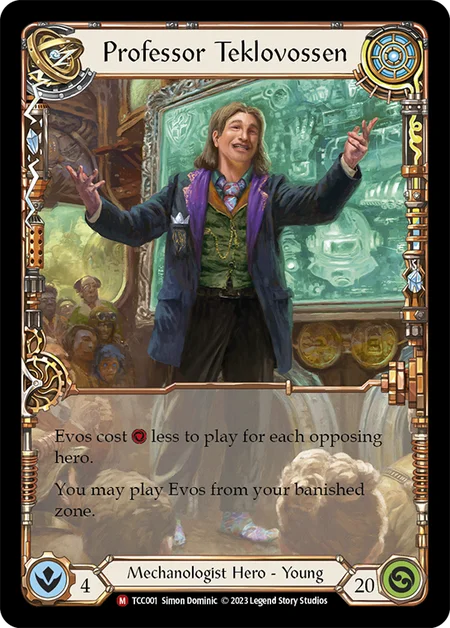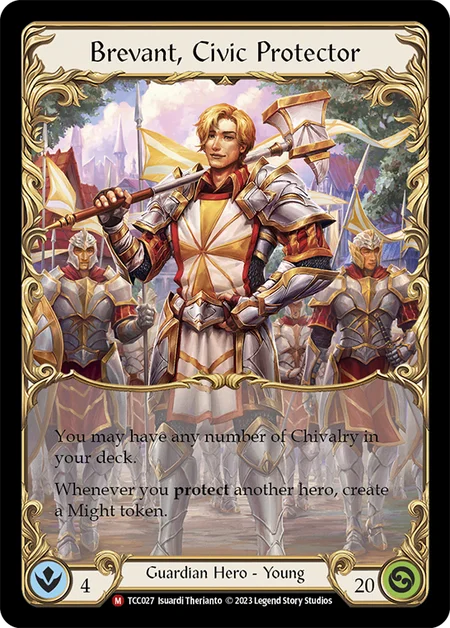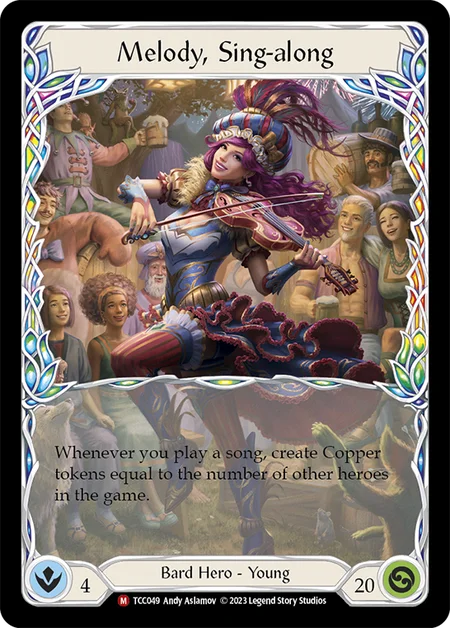
My name is Alex Truell, and for over 2 years now I've been the editor for the Rathe Times. I'm a casually competitive player currently in the midst of transplanting a Flesh and Blood scene to a new shop in Oshkosh, WI.
Strategically, I try not to follow trends, instead fixating on cards and tactics just outside the mainstream.
I view this game through the lens of a player who cares about the competitive environment, but doesn't have to live in it; an optimist who loves the game, but can take a step back to critique it; and a deckbuilder who revels in novelty.
Thoughts and Baubles is an editorial space for the Rathe Times, where I discuss the game and respond to the community.
While Bright Lights is setting up a brave new world of exclusively Mechanologist heroes, another product is primed to greatly expand the hero roster. Round the Table, a boxed set of 4 Blitz decks created in partnership with Tolarian Community College, is set to release just ahead of the next expansion; and for a fun-focused player like me, its selection of peculiar heroes is incredibly exciting.

Professor Teklovossen is, essentially, a showcase for the upcoming expansion, ideally positioned in advance of an influx of cards that will, presumably, support his archetype. He's also the most likely to see play in the standard Blitz environment. You wouldn't guess it from the art, but Professor looks to be a somewhat traditional physical threat, albeit with a 'build up' strategy that requires a few turns to assemble his endgame Evo engine.

A Solanian Guardian is an incredibly cool narrative addition, and I hope to see this particular angle fleshed out beyond a single young hero. Mechanically, Brevant is encouraged to both protect others and absolutely pulverize them. The former becomes relatively unusable in the standard Blitz format, while the latter makes for forced politics in group games. Sitting down to UPF with Brevant means someone's gonna have a friend, though the inevitable need for a single winner adds inevitable betrayal to that contract.

The Bard fandom has long awaited a card pool, but just what are we supposed to do with a half-dozen non-attack action 'songs' that exclusively provide advantages to everyone but us? It's incredibly thematic, but until we see some incredible payoff cards, I can't imagine why you'd bring an NPC to a UPF. Melody is looking to be a complete non-starter in Blitz, but at least she's legal. (Alas, poor Yorick.)

Oh, and there's Ira. Yeah, she's... also in the box. You may remember her from 'winning all the Blitz events before Tales of Aria'. Maybe a song will sooth her, but you're probably better off trying to ally with her and ignoring the fact that she's definitely gonna stab you in the back later.
I swear I didn't set out to be so hard on these characters. I really, truly, am incredibly stoked about them. I want to build a protective Guardian! I want to play as a Bard! But as of this moment, there's just not a format where helping another player makes sense. And while I'm nearly certain Round the Table will surprise us with cards that make these strategies viable, there's an inherent dissonance when the goal of the game is to be the last hero standing.
The flaw in Round the Table is not the product. It's the lack of a format to support it.
Ultimate Pit Fight is a Liability
In a recent video, Joey Senart discussed the shortcomings of the Ultimate Pit Fight format by comparing it to other games where similar battle royale gameplay does work.
If you've ever played UPF, you'll understand when I say that there's a serious problem with downtime. And with the rule that you can only interact with the players to your left and right, there's literally no reason to pay any attention to what's happening across the table. UPF is the FAB format that introduces the snap mechanic, as in: *snap "Hey, it's your turn." It's actively disengaging.
That's because, if you're not making a decision about your own hand, the game doesn't even present you with enough information to advise someone else. Legitimately, you've got nothing to do, nothing to evaluate, nothing to strategize related to anyone who isn't immediately adjacent. Despite it's promise of large-scale chaos, expanding beyond 3 players makes the game less exciting.
If you've played UPF and enjoyed it, that's most likely because you enjoy the company of people you played it with. The format isn't doing any of the lifting there. I'd challenge you to replace FAB with the Bridgerton board game and tell me if you and your friends don't have a better time.
Round the Table is a super fun looking product, but it's hitched its wagon to the dead horse that is Ultimate Pit Fight, and that puts it at serious risk of being judged a failure.
It's High Time We Had a Collaborative Format
But there's hope for Round the Table, even now. Its release may be marred by judgments against the competitive viability of the decks included and against UPF, but it has incredible potential as a legacy product when the long-developing PvE (player vs. environment) format comes to fruition.
Imagine, instead, that there's a major threat to the world of Rathe. Professor Teklovossen has figured out a solution, but it'll take time to build the device necessary to defeat this foe. Unfortunately, the threat is just outside Metrix now, and it's up to you to buy him time. Ira - resurrected to combat the threat - is prepared to put her second life on the line, if you can just keep her alive and fighting. To that end, Brevant faces the threat with attention split between his own attacks and protecting his allies. "Speaking of allies, where did Melody dart off to? I can hear her, but... wait, am I glowing?"
This is such a radical reframing of the characters that I'm tempted to build a PvE format in the next month, because I desperately want to enjoy Round the Table when it releases. (I'm looking at Enemy cards added to each player's decks, revealed when drawn to move the plot forward and hinder our heroes in unexpected ways, rather than an automation setup for an enemy hero card with bolstered health.) And it's exactly the tonal shift that justifies another format - something that FAB has struggled with as it's introduced constructed deck formats.
A cooperative format would give you a reason to pay attention during other players' turns, drive table talk, and solve the issue that is central to UPF's struggles right now: a lack of visible threat.
I hope that LSS is serious when they say they've spend years developing a robust PvE format; but in the meantime, UPF is not a substitute and we need to stop pitching it like it is.



